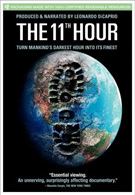The 11th Hour, an environmental documentary produced and narrated by Leonardo DiCaprio, invites comparison to another recent global warming warning documentary, An Inconvenient Truth. Unfortunately, or fortunately for me, I haven’t seen An Inconvenient Truth, so Leo’s call to action is going to have to stand or fall on its own merits. Mostly it falls. To the extent that this documentary got made and into theaters (where it grossed less than a million dollars) is thanks to Leonardo DiCaprio’s name. Despite his prominent billing, the heartthrob turned pretty good actor is a fairly minor player in what is essentially a series of talking heads intercut with stock footage, news clips of natural disasters, and some rather beautiful film of our world. The real stars are the twenty or so environmental experts and activists who try to convince us that if we don’t get off our asses and do something about our carbon footprint, we’re all gonna be dead soon.
It’s something of a dull format. An expert talks about how we are screwing up the planet and then film is shown of the planet being screwed up. Then another person talks about how we are screwing up the planet and then more footage is shown. Then Leo gives an overarching theme about what the experts are going to say next, and then they do. It’s very PBS or Discovery Channel and why it ended up as a feature film rather than a television special isn’t very clear. Co-writer/directors Nadia Conners and Leila Conners Petersen are banking on the direness of their message to overcome the uninteresting delivery.
Other than a few comments by the likes of Stephen Hawking’s electronic voice or noted environmentalist Mikhail Gorbachev, most of the talking heads are complete unknowns. Maybe David Suzuki and Kenny Ausubel are famous and I’m just out of it, but I’m thinking most people who watch this DVD won’t know who they are. There isn’t any attempt to give their bonafides, you’re just supposed to take on faith that if a person wrote an environmental book or leads a group called “The Tree People,” he or she knows what they are talking about. Mostly they are convincing in what they say, but they don’t do it in a particularly interesting or unique way.
The clear point of this movie is to get you moving in a way that will improve the planet and save humanity from death. After all, they spend two-thirds of the 92 minute running time saying, over, and over, and over, “things are bad, it’s really bad, it’s really, really bad and we don’t have much time.” They just don’t ever quite get to what we can do about it. The last third notes that we can do things, but is never clear in what exactly we should do. Vote for something, vote against something, bring our grocery bags to the supermarket, recycle, buy an electric car, what? It’s a wasted opportunity and the only thing that really comes out is, “we can do something and we have to do it right now.” It’s the details that are sketchy.
The documentary has “preaching to the choir” written all over it. For the few that might watch and not already be aware of the environmental problems, it doesn’t give any direction on what to do next. It’s actually surprising that such an important and passionate subject is given such a pedestrian presentation. The best part of The 11th Hour is showing some beautiful shots of the world that the creators tell us we need to stop destroying. The weakest parts of the documentary are the unimaginative talking heads and the lack of any specific information on what a viewer should do to help. Unfortunately, the DVD extras consist entirely of things that the documentary does poorly and nothing of what it does well.
The extras are an additional 90 minutes of material broken up into five featurettes. All of the featurettes are solely unused interviews with the environmentalists and activists who provide comments during the documentary itself. In effect, these are deleted scenes. Very, very boring deleted scenes. It’s like listening to a lecture about biomimicry or environmental law or sustainable design. It might interest those who read the types of books these activists and authors write, but not anyone else.
The five featurettes are called “Nature’s Operating Instructions and Solutions,” “Solutions We Have Right Now,” “Wonder of the World,” Our Reactions in the Face of Environmental Collapse,” and “Religious Perspectives.” Even the names are often misnomers. There are no real solutions provided, or if they are, they are so high level as to leave the average viewer unsure how fits in. It just looks like they had all this extra footage laying around and decided to slap it together and give it an overall title that would make it seem like more than the sum of its parts.
Your Daily Blend of Entertainment News
The DVD is sold in a 100% renewable resource and is really a nice way to present a movie. It’s pretty light and is easy to store. It has all of the artwork, just dumps that annoying plastic case. The inner flap directs you to websites that will give you more information about how to help, in a sense doing what the DVD should have done.
The film does look good, even as environmental holocausts are being shown. The low budget look of the packaging might throw you but the picture and sound are good quality. If you are just looking for something to reinforce what you already believe, this might be something you’ll enjoy, despite a bland format.

